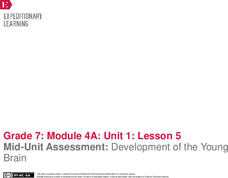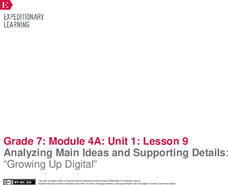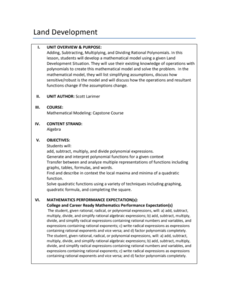EngageNY
Mid-Unit Assessment: Development of the Young Brain
Scholars view a video clip about adolescent brain development and work with partners to identify the main idea and supporting details. Next, as part of the mid-unit assessment, pupils watch another clip from the video and complete a main...
EngageNY
Analyzing Main Ideas and Supporting Details: “Growing Up Digital”
Young scholars continue their exploration of adolescent brain development by reading an informational text, "Growing Up Digital," by Matt Richtel. Then, with partners, they complete note-catcher worksheets to capture the article's main...
EngageNY
Mid-Unit Assessment: Analyzing Point of View and Plot Development in Flush
It's the halfway point—there's no turning back now. Scholars work on the mid unit assessment for Flush. For the assessment, learners analyze the point of view and plot development by annotating the text using sticky notes and underlining...
EngageNY
Analyzing Plot Development across Flush
The end. Scholars discuss how the end of the text in Flush contributes to the plot development of the story. They then write book reviews to share their thoughts about the story. After finishing their book reviews, learners share them...
Curated OER
Reproduction, Day 2: Pregnancy
Nearly all students have seen pregnant women and may have questions about human development. Intended for secondary students with mild to moderate mental disabilities, this lesson defines the process of pregnancy in a developmentally...
Curated OER
Summer Reading to Encourage Professional Development
A compilation of titles to engage, motivate, and inspire educators for another year of teaching and learning.
Curated OER
Finding Main Ideas
Elementary schoolers read paragraphs one at a time in order to pick out the main ideas. They choose which sentences are most important in a paragraph. This type of exercise prepares learners to identify the main idea in longer narratives.
DeKalb County Schools
Compare/Contrast
A series of reading activities is sure to engage your young readers! Based on comparing and contrasting ideas, the packet provides opportunities to compare characters, themes, texts, and other elements of fiction.
K12 Reader
"How Do I Love Thee?" Supporting Ideas
Show your class what poem the famous line "How do I love thee? Let me count the ways" comes from. Class members read Elizabeth Barrett Browning's poem and respond to one question with a short paragraph. The question asks learners to use...
Centre for Clinical Interventions
Social Skills Treatment Programme
Even though they may not be tested on standardized assessments, social skills are vital for students to develop during their years in school. Through a series of discussions, activities, and role-playing exercises, these lessons teach...
Literacy Design Collaborative
Analyzing the Development of Theme through Pivotal Moments
Liliana Heker's "The Stolen Party" and Martha Salinas' "The Scholarship Jacket" provide sixth graders with an opportunity to identify key scenes that authors use to develop their themes.
Radford University
Land Development
Groups work with polynomials to devise functions that will model a selling price for property. The teams determine variables to create expressions to represent the cost required to develop land into a housing addition. Classmates then...
EngageNY
Mid-Unit Assessment: Evidence, Ideas, and Interactions in “Why Couldn’t Snow White Be Chinese?”
The class is halfway there! Pupils complete a mid-unit assessment by answering questions in Evidence, Ideas, and Interactions in Why Couldn’t Snow White Be Chinese? Readers then work with partners to analyze the 2010 Census: United...
Curated OER
Plot Development and Conflict
Students explore plot development and how conflicts are resolved. In this plot development and conflict lesson, students discuss antonyms and list the ones they find in their story. Students complete online activities and write a summary...
Curated OER
Teenage Boys: Perspectives on the Adolescent Male's Development in an Urban Setting
Learners examine the effects of an urban setting on the development of male adolescence. After watching a film, they identify the problems in the relationship of the characters. They discuss the impact of becoming a teenage father and...
National Library of Medicine
Your Environment, Your Health: Runoff, Impervious Surfaces, and Smart Development
Can a sidewalk increase the amount of pollution in local streams? Scholars learn the answer to this question though research and experimentation in the fifth unit in the six-part series. Pupils study runoff, impervious surfaces, and the...
Curated OER
The "Write" Stuff: Strategies and Conventions for Imaginative Writing
A comprehensive and immersive series of lessons that examines various aspects of story development leads learners into writing a narrative of their own. Writers develop an understanding of the writing process as they use the learning...
EngageNY
Developing Reading Fluency: Criteria for Reading Aloud
Third graders develop their reading superpowers in a lesson plan on fluency. After first listening to an audio recording or teacher read aloud, the class works together identifying criteria for fluent reading, focusing on phrasing, rate,...
EngageNY
Developing Reading Fluency: Selecting a Text and Practicing Reading Aloud
Young readers continue to strengthen their fluency skills with a text of their choosing. The teacher first engages the class with an audio recording or read-aloud of a short poem, modeling for children how to read fluently. Next it's...
Curated OER
Creating Supporting Characters
Supporting characters need detail and characteristics just like a main character. Keep your budding authors entrenched in detail as they write their novels. This lesson focuses on developing supporting characters using personal...
Primary Success Publication
St. Patrick’s Day Ideas
Poems, activities, games, recipes, and leprechaun tricks abound in a resource packet designed for St. Patrick's Day. There are even measuring, graphing, and mapping activities. How lucky!
American Psychological Association
Developing Adolescents
Why to young people act the way they do? Scholars investigate the stages of adolescent development incorporating high school psychology techniques. Using research from the American Psychological Association, they uncover the five areas...
Curated OER
Developed or Undeveloped?
Students watch slides of other countries to identify and discuss factors that make a country developed or developing. They create a product that shows their view of developed and undeveloped.
Curated OER
A Cost-Effective Model of Teacher Development
As funding for staff-development days dwindles, Professional Learning Communities offer a no-cost alternative for professional development.
Other popular searches
- Professional Development
- Child Development
- Character Development
- Vocabulary Development
- Early Childhood Development
- Developmental Learning
- Human Growth and Development
- Infant Development
- Oral Language Development
- +Developmental +Learning
- Developmental Psychology
- Fetal Development

























